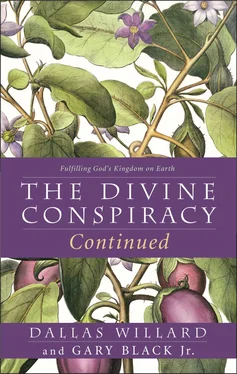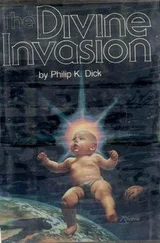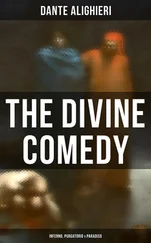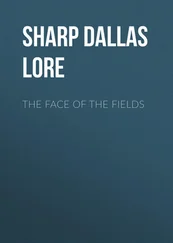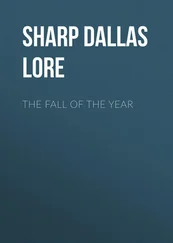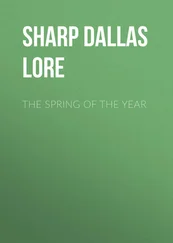In the decade that followed I gradually lost sight of that early vision of God and his kingdom. Like the weeds that grew up and choked off the seed, my desires for my professional career began to take precedence in my heart and pull me away from the easy yoke of Christ. Mercifully, it was during this period that, while in the waiting room at my doctor’s office, I came across a Christianity Today article discussing The Divine Conspiracy . I raced to the bookstore, bought it, and read it cover to cover that weekend. And the hope and grace that had become a fleeting memory started to gradually flood into my heart once again. All those distant longings for wonder and excitement began to percolate toward the surface. I read it over and over during the next several months. In many ways The Divine Conspiracy introduced me to a Jesus that was so much more than my religious stereotyping had allowed. Dallas knew a Jesus far grander than I had assumed him to be and as a result my love and respect for Christ grew exponentially. The weeding had started.
But habits are hard to break, and transformation can be slow, especially for a stiff-necked person like me. It wasn’t until nearly another decade had passed that I fully relinquished myself to God’s call on my life. I retired from my career in the financial services industry and entered seminary. It was also around that time I was able to reconnect with both Keith and Dallas. What amazing grace those two reunions represent in my life.
My seminary experience helped me to place Dallas’s theology in context and recognize his insights were more than just another commentary on Christian doctrine, a program of discipleship, or plan for spiritual formation. I realized Dallas was articulating and advocating an understanding of the gospel that was often significantly at odds with the theology taught in the institutions and traditions of mainstream evangelical religion in America. As a result only a few pastors, and even fewer theologians, were critically engaging Dallas’s work. Once again with Keith’s guidance and Dallas’s encouragement, I began to recognize the need and opportunity to introduce Dallas’s theology and understanding of pastoral leadership more deeply into theological education. After completing my seminary degree, I entered a Ph.D. program in the United Kingdom, where I completed my dissertation on “Willardian” theology, hoping to offer some insight into and remedy for this situation. 1
During those years Dallas offered tremendous assistance. He spent countless hours with me, patiently enduring my endless inquiries, sharing materials, e-mails, phone calls, encouragement, wisdom, and prayer. He faithfully read through each chapter of my dissertation and my revisions, as I endeavored to accurately portray his theology and its effects. I completed my degree in April 2012, and accepted a position in the Graduate School of Theology at Azusa Pacific University.
A wonderful benefit of moving to southern California was the opportunity to be closer to Dallas. We took advantage of that proximity during the last year of his life. One of my most treasured moments was presenting Dallas and Jane with a bound edition of my dissertation and news of a publishing contract to adapt the dissertation for a wider audience. We shared a wonderful afternoon together reminiscing about all God had done for us in the twenty years since we first met. Those were good times.
It was in June 2011, when, in passing, I first suggested to Dallas that he should consider writing a follow-up to The Divine Conspiracy . As I was combing through his writings, interviews, and lectures for my dissertation, it seemed to me there was a collection of insights, explanations, and applications he had developed related to the kingdom of God that had not been given ample treatment in his other published works. I thought readers could benefit from the way he had expounded on several issues and realities of contemporary life in the years since The Divine Conspiracy was published. We kicked around some ideas and potential chapter topics over the next several months. Eventually he agreed about the potential benefit of such a book. It was only when his medical condition was not improving as rapidly as he hoped that he suggested the idea of coauthoring the book. By January 2013, we had formatted the basic structure of what eventually became the final product.
In March 2013, his health continued to weaken. By then we had formal outlines of each chapter, discussed particular examples, and made a myriad of choices about what to include and what to omit. Before his death, we had several chapters complete and a clear understanding of what was left to finish. We tried diligently to finish the manuscript before he passed. We were very close. As it turns out we were only six weeks short. It was just a few days after we had arrived at our completed outline for the final chapter that I received that fateful call from Jane and kissed my family good-bye to join Dallas as he began his final journey into eternity. What I would have given for just six more weeks. We tried.
As I drove to the Willard home, I had a feeling this was the beginning of the end of his life. In some ways that drive allowed me to prepare. I didn’t know what exactly the next days or weeks held, but I did have a sense that difficulty and sorrow were ahead. Yet I also sensed that there would be a significant blessing as a result.
I spent the next four days with Jane and the family watching over Dallas’s final hours. It was a very sacred time, one I will treasure for the rest of my life. We talked about many things and were able to conclude some of our conversations we had engaged in off and on for months, if not years. Some of these discussions were very intimate and private, and will remain so. Yet, as Dallas was coming to grips with his own physical death, and our talks tended to naturally turn toward the subject of our life and hope after death, heaven, and eternity, we also began to discuss how our character developed here on earth continues into eternity and all the implications that fact might carry for our life both now and then. As our conversations developed, Dallas and I began to realize others might benefit from the fruit of these interactions. Therefore, before his death he encouraged me to continue thinking and writing on these topics. I promised him I would. It was his final request of me. I am hopeful that work should become available in the near future.
In terms of worldly fame, Dallas was not what most would consider a “famous” man. Although he maintained a very faithful following, there are still many devoted Christians who have never heard of Dallas or his ideas—a surprising fact I routinely encountered as I was researching his theology. Undoubtedly he had earned respect and acclaim in certain arenas such as academic philosophy and the field of spiritual formation. But his notoriety did not reach as far as those who love Dallas and are familiar with his works often presume. Much of his work and a good majority of his ideas remain relatively unknown to a wide spectrum of Christian readers. Therefore, it is likely this work will find itself in the hands of those previously unaware of Dallas and his unique, life-giving perspectives on the gospel.
The book before you is an attempt to extend a set of proposals and perspectives on the kingdom of God and the gospel of Jesus first published in The Divine Conspiracy (1998). The Divine Conspiracy was originally conceived as a set of teachings Dallas started developing during his time at the University of Wisconsin while completing his doctoral work. In summary, The Divine Conspiracy is an articulation of the intent and effect of the gospel of the kingdom of God, which Jesus revealed most pointedly in the Sermon on the Mount. In laying out Jesus’s plan for attaining life to the full, Dallas not only deconstructed some significant alterations to Jesus’s original message contained in both liberal and conservative forms of contemporary Christianity; he also simultaneously reconstructed a positive and hopeful vision of the kind of existence human beings were created to experience under the loving and grace-filled reign of God.
Читать дальше
